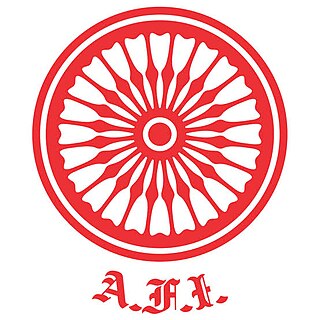| Abbreviation | AGF |
|---|---|
| Successor | Olympic Council of Asia |
| Formation | 13 February 1949 |
| Dissolved | 16 November 1982 |
| Type | Sports federation |
| Purpose | Organizing the Asian Games |
Region served | Asia |
Membership | Asian National Olympic Committees |
The Asian Games Federation (AGF) was the governing body of sports in Asia from 1949 to 1982. The federation was disbanded on 16 November 1982 in New Delhi and succeeded by the Olympic Council of Asia. The AGF was responsible for the organisation of the Asian Games from 1951 to 1982. [1] [2] The Federation was established on 13 February 1949, in a meeting held in Patiala House in New Delhi.
In March 1947, Jawaharlal Nehru, who later became the first prime minister of India, held the Asian Relations Conference in New Delhi—a meeting with a prospect to bring the possibility of Asian Games under the attention of participating countries. [3] Before the conference, Guru Dutt Sondhi, who was the member of the International Olympic Committee for India, encouraged Yadavindra Singh, Maharaja of Patiala and the then-president of the Indian Olympic Association (IOA), to communicate with meeting attendees to establish the Asian Games Federation. [4] The proposal was not acknowledged by some representatives and the rest, who approved, refused to make any commitment. [3]
In July 1947, the IOA, which initially was advocating the organisation of Games, retracted its patronage for unknown reasons. Sondhi found an alternative; rather than organising a multi-sport event, for which he needed an approval of the IOA, he opted for a single event championship titled the Asian Athletic Championships—a track and field event. Sondhi, who was also the president of the Amateur Athletic Federation of India (AAFI) (now Athletics Federation of India), received the consent of federation in February 1948. Yadavindra, on the request of Sondhi, became the president of the organising committee for the Championship, and Sondhi took the position of chairman. In early July, formal invitations were sent to various Asian countries, backed by the letter from the AAFI. But the response was not positive as there was a scheduling conflict with the 1948 Summer Olympics, which were scheduled from 29 July. [5]
During the 1948 Olympic Games, Sondhi held a meeting on 8 August 1948, at Mount Royal Hotel in London. Invitations were sent to all the Asian National Olympic Committees present in London at that time. Chief Managers of Korea, China, Philippines, Singapore, Burma, Ceylon, India, Pakistan, Afghanistan, Iran, Iraq, Lebanon and Syria were called for the meeting, but only representatives from Burma, Ceylon, China, India, Philippines, and Korea attended. [5] Sondhi made two proposals: first, to organise an Asian Athletic Championship in February 1949 in New Delhi, and second, to establish the Asian Games Federation, based on the IOC model. Founder of the Philippine Amateur Athletic Federation and first Filipino member of the International Olympic Committee Jorge B. Vargas stoutly backed the second proposal, and the first proposal was accepted by the attendees with an amendment. For the further development of the federation, a decision was made to conduct a meeting during the Championship in New Delhi in February 1949, and a sub-committee, consisting representatives from four nations, was appointed to draft the constitution and ordinances of the federation. [6] [3]
The Asian Athletics Championship was not realised due to "unsettled conditions" and economic difficulties of participating nations, but a meeting was organised at the Patiala House, in Delhi, among the representatives of nine Asian nations, on 12 and 13 February 1949. The meeting was attended by the representatives of Afghanistan, Burma, Ceylon, India, Indonesia, Nepal, Pakistan, Philippines and Thailand. The drafted constitution, presented by the sub-committee, was again revised as per the Olympic Charter—the constitution of the International Olympic Committee—and accredited. To avoid the ambiguity generated by the literal meaning of term "athletic", sub-committee rectified the primitively proposed title of the federation from Asian Amateur Athletic Federation to Asian Games Federation. Afghanistan, Burma, India, Pakistan, and the Philippines became the first five members of the Asian Games Federation after signing the constitution in its full term; the other four attendees also signed it, but it still needed the ratification by their governments or their National Sports Associations or National Olympic Committees. The federation elected Yadavindra Singh as the president, Jorge B. Vargas as vice-president, and G. D. Sondhi as secretary treasurer. [5]

The Asian Games, also known as Asiad, is a continental multi-sport event held every fourth year among athletes from all over Asia. The Games were regulated by the Asian Games Federation (AGF) from the first Games in New Delhi, India in 1951, until the 1978 Games. Since the 1982 Games, they have been organized by the Olympic Council of Asia (OCA), after the breakup of the Asian Games Federation. The Games are recognized by the International Olympic Committee (IOC) and are described as the second largest multi-sport event after the Olympic Games.

The 1954 Asian Games, officially known as the Second Asian Games – Manila 1954 was a multi-sport event held in Manila, Philippines, from May 1 to 9, 1954. A total of 970 athletes from 19 Asian National Olympic Committees (NOCs) competed in 76 events from eight sports. The number of participating NOCs and athletes were larger than the previous Asian Games held in New Delhi in 1951. This edition of the games has a different twist where it did not implement a medal tally system to determine the overall champion but a pointing system. The pointing system is a complex system where each athlete were given points according to their achievement like position in athletics or in swimming. In the end the pointing system showed to be worthless as it simply ranked the nations the same way in the medal tally system. The pointing system was not implemented in future games ever since. Jorge B. Vargas was the head of the Philippine Amateur Athletic Federation and the Manila Asian Games Organizing Committee. With the second-place finish of the Philippines, only around 9,000 spectators attended the closing ceremony at the Rizal Memorial Stadium. The events were broadcast on radio live at DZRH and DZAQ-TV ABS-3 on delayed telecast.

The 1951 Asian Games, officially known as the First Asian Games, was a multi-sport event celebrated in New Delhi, India from 4 to 11 March 1951. The Games received names like First Asiad and 1951 Asiad. A total of 489 athletes representing 11 Asian National Olympic Committees (NOCs) participated in 57 events from eight sports and discipline. The Games was the successor of the Far Eastern Games and the revival of the Western Asiatic Games. The 1951 Asiad were originally scheduled to be held in 1950, but postponed until 1951 due to delays in preparations. On 13 February 1949, the Asian Games Federation was formally established in Delhi, with Delhi unanimously announced as the first host city of the Asian Games.

The Indian Olympic Association (IOA) or Indian Olympic Committee (IOC) is responsible for selecting athletes to represent India at the Olympic Games, Asian Games and other international sports competitions, and managing Indian teams at these events. It goes with the name of Team India. It also acts as the Indian Commonwealth Games Association, responsible for selecting athletes to represent India at the Commonwealth Games.
Anthony Stanislaus de Mello was an Indian cricket administrator and one of the founders of the Board of Control for Cricket in India (BCCI). He also helped launch the Asian Games as the chairman of the organising committee for the first Asian Games in Delhi.
Guru Dutt Sondhi was an Indian sports administrator in India. Sondhi was manager of the British Indian Olympic hockey team at the 1932 Summer Olympics, founder of the Western Asiatic Games and the founder of the Asian Games Federation, which held the first Asiad. At the time of the inaugural Asian Games in New Delhi, he was the Secretary General of the Indian Olympic Association.

Bhalindra Singh was an Indian sports administrator and former first-class cricketer. Singh was an influential sports administrator who held positions in international and Indian sports governing bodies.

Yadavindra Singh was the ninth and last ruling Maharaja of Patiala from 1938 to 1947. Singh kept his royal titles until 1971, when princely titles were abolished through the 26th Amendment to the Constitution of India. In his life, Singh was also a diplomat, sports administrator and former cricketer who played one Test in 1934.

The National Games of India consist of various disciplines in which athletes from the different states of India participate against each other. The country's first few Olympic Games, now renamed as National Games, were held in North India (Delhi, Allahabad, Patiala, Madras, Calcutta and Bombay.

India is a member of the South Asian Zone of the Olympic Council of Asia (OCA), and has participated in the Asian Games since their inception in 1951. The Indian Olympic Association, established in 1927, and recognised in the same year by the International Olympic Committee, is the National Olympic Committee for India.

Afghanistan is a member of the Central Asian Zone of the Olympic Council of Asia (OCA), and has participated in the Asian Games since their inception in 1951. The National Olympic Committee of the Islamic Republic of Afghanistan, established in 1935 and recognised by the International Olympic Committee in 1936, is the National Olympic Committee for Afghanistan.

Myanmar is a member of the Southeast Asian Zone of the Olympic Council of Asia (OCA), and has participated in the Asian Games since the inception of the Games in 1951. The Myanmar Olympic Committee, established in 1947 and recognised in the same year by the International Olympic Committee, is the National Olympic Committee for Myanmar.

Pakistan is a member of the South Asian Zone of the Olympic Council of Asia (OCA), has participated in the Asian Games since their second edition in 1954. The Pakistan Olympic Association, established in 1948, and recognised in the same year by the International Olympic Committee, is the National Olympic Committee for Pakistan.

The Philippines is a member of the South East Asian Zone of the Olympic Council of Asia (OCA), and has participated in the Asian Games since their inception in 1951. The Philippine Olympic Committee, established in 1911, and recognized in 1929 by the International Olympic Committee, is the National Olympic Committee for Philippines.

Randhir Singh is an Indian sports administrator and former sports shooter. Singh is one of India's most influential sports administrators and is noted for his wide-ranging international connections. He has held several positions in both Indian and international sports governing bodies, and also had a successful shooting career before retiring from the sport in 1994. Singh began his sports administration career in 1984, while he was still competing as a shooter.
Shooting sports have been contested at the Commonwealth Games at every games since 1966 with the exception of the 1970 and 2022 Commonwealth Games.
Sohrab H. Bhoot was an Indian Olympian administrator and sports administrator in the early and middle 20th century.

The Athletics Federation of India (AFI) is the national governing body for Athletics sport in India, and is responsible for conducting competitions in the country. It was formed in 1943. It is affiliated to World Athletics and Asian Athletics Association (AAA).
There have been concerns and controversies about the 2022 Commonwealth Games, which were held in Birmingham, England.

The Asian Games is Asia's multi-sport event, normally held every four years. The games are regulated by the Olympic Council of Asia (OCA) and recognized by the International Olympic Committee (IOC). Football was first introduced as a sport at the inaugural edition of the Asian Games, which was held in India in 1951. The India national team hosted five other national teams, winning the competition to become the first Asian football champions; the AFC Asian Cup began in 1956, two years after the formation of the Asian Football Confederation (AFC). India competed in eleven Asian Games between 1951 and 1998, missing the 1990 and 1994 games. The team won a gold medal at the 1962 Games and a bronze in 1970. For the 2002 Busan Asian Games, the rules were changed so that only under-23 national teams were allowed to compete. India's U-23 national team has not yet won a medal at the Asian Games.